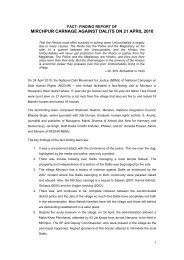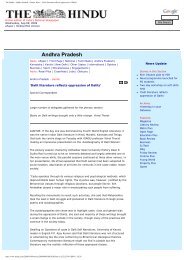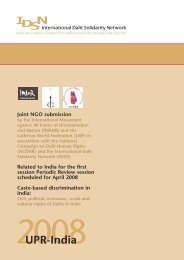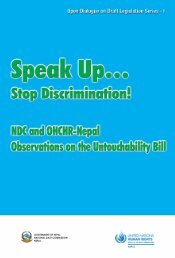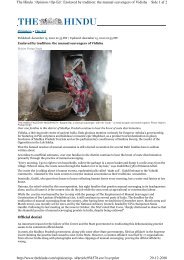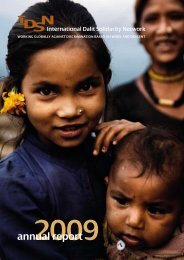318 Wisconsin <strong>International</strong> Law Journal3. RESERVATIONS IN THE PRIVATE SECTOREconomic liberalization in India—with its underlying philosophyof increased reliance on market forces, a dismantling of controls, and adrastically reduced role of the state—has resulted in a shrinking of thepublic sector. The reservations model is therefore affecting—and able toassist—fewer people, inasmuch as government-related jobs are beingdrastically reduced. 345 Though poorly monitored and enforced, there is,as noted above, evidence to support the notion that <strong>Dalit</strong>s have benefitedfrom the quota system. 346 Substantial divestment in the public sector,including the proliferation of joint ventures formed between public sectorundertakings and private companies, both domestic and foreign, serves toseverely undercut the reach of the reservations policy. 347 According to<strong>Dalit</strong> theorist Dr. Anand Teltumbde,even if such entities technically remains a PSU [Public SectorUndertaking] and follows the reservation policy sincerely, it wouldstill have little or no scope to absorb the dalits in its staff. Whatevermay be the strategic considerations, the fall out of this processpractically amounted to shutting the doors of these new agecompanies to the dalits and to potential neutralization of thereservation policy. 348Reservations in educational institutions and scholarships for<strong>Dalit</strong> students represent a critical component in <strong>Dalit</strong> socio-economicdevelopment. Economic reforms have, however, led to a freezing ingrants to many institutions. 349 The privatization of social services isturning education and health services into commodities only affordableto the rich. 350 A blind faith adherence to privatization as the lone paththat India must take, combined with the pretext that reservations345 Jogdand notes the loss of over 350,000 public sector employment opportunities between 1992–99 as a result of the downsizing of the state. Jogdand, supra note 317, at 328.346 See Teltumbde, supra note 152, at 13 (arguing that reservations in public sector employmenthave had positive effects, albeit limited ones, on the situation of <strong>Dalit</strong>s, providing a degree ofbureaucratic influence to some, and providing hope of advancement to many).347 Id. at 13.348 Id.349 Id. at 12.350 Narula & Macwan, supra note 156; Teltumbde, supra note 152, at 12 (noting that spending oneducation has decreased while foreign universities increasingly partner with corporations to offerpricy outpost courses. Prestigious institutions have had to raise their fees while the new evenmore competitive job market is made harder to access for people who cannot afford to attendthose schools. Children in village schools especially lose out from an early age because theylack the ability to speak English, which business has turned into a hot commodity.). See alsoThorat & Macwan, supra note 158, at 260.
Vol. 26, No. 2 Equal <strong>by</strong> Law, Un<strong>equal</strong> <strong>by</strong> Caste 319undermine India’s ability to compete in the global market, 351 isseamlessly “superimposed on . . . traditional <strong>caste</strong> prejudice” 352 to all butseal reservations’ ominous fate. In response, sectors within civil societyand some government actors and agencies have supported a proposedextension of reservations to the private sector. 353The National Commission for Scheduled Castes and ScheduledTribes has stated that the private sector, which continues to enjoygovernment patronage—through concessional land, financing, and exciseand sales tax relief—should also be brought under the purview of thereservation policy. 354 Indian economist, Sukhadeo Thorat, has argued infavor of extending reservations to the private sector to redress marketdiscrimination against <strong>Dalit</strong>s. According to Thorat, <strong>caste</strong>-based marketdiscrimination not only exacerbates in<strong>equal</strong>ity but is also “retrogressivefor economic growth.” 355 Thorat and Newman argue that discriminationhere should be understood as the result of social exclusion of <strong>Dalit</strong>s. 356The restrictions placed <strong>by</strong> <strong>caste</strong> on <strong>Dalit</strong>s’ ability to participate in themarket, and the fact that the benefits of an exploitative market outweighthe intangible costs to <strong>Dalit</strong>s, mean that we cannot simply rely on acompetitive market to self-correct discrimination. 357 Strong opposition tothe private sector proposal remains, however, from both privateemployers and certain political parties. Private employers have criticizedthe government for failing to provide <strong>Dalit</strong>s adequate opportunities ineducation and for imposing upon the private sector the obligation toemploy individuals they deem unqualified. 358As detailed in Part II.C., India has indeed failed to provide <strong>Dalit</strong>sadequate opportunities in education. The notion that more must be doneto increase educational opportunities and ensure non-discrimination in351 Thomas E. Weisskopf, Globalisation and Affirmative Action, in RESERVATION IN PRIVATESECTOR, supra note 158, at 266.352 Teltumbde, supra note 152, at 14.353 See BHOPAL CONFERENCE: CHARTING A NEW COURSE FOR DALITS FOR THE 21ST CENTURY,JAN. 12-13, 2002, THE BHOPAL DECLARATION,http://www.indiatogether.org/dalit/events/bhopal.htm (last visited Aug. 16, 2008). Article 19 ofthe “Bhopal Declaration” calls for mandatory reservations in the private sector.354 See BROKEN PEOPLE, supra note 21, at 4.355 Sukhadeo Thorat, On Reservation Policy for Private Sector, ECON. & POL. WKLY, Apr.-July2004, at 2560.356 Sukhadeo Thorat & Katherine S. Newman, Caste and Economic Discrimination: Causes,Consequences, and Remedies, in LABOR MARKET DISCRIMINATION, supra note 325, at 2.357 Id. at 4.358 Priyanka Bhardwaj, India Debates Private Sector Quotas, ASIA TIMES ONLINE, Feb. 7, 2006,http://www.atimes.com/atimes/South_Asia/HB07Df01.html (last visited Aug. 16, 2008).
- Page 1 and 2:
EQUAL BY LAW, UNEQUAL BY CASTE: THE
- Page 3 and 4:
Vol. 26, No. 2 Equal by Law, Unequa
- Page 5 and 6:
Vol. 26, No. 2 Equal by Law, Unequa
- Page 7 and 8:
Vol. 26, No. 2 Equal by Law, Unequa
- Page 9 and 10:
Vol. 26, No. 2 Equal by Law, Unequa
- Page 11 and 12:
Vol. 26, No. 2 Equal by Law, Unequa
- Page 13 and 14: Vol. 26, No. 2 Equal by Law, Unequa
- Page 15 and 16: Vol. 26, No. 2 Equal by Law, Unequa
- Page 17 and 18: Vol. 26, No. 2 Equal by Law, Unequa
- Page 19 and 20: Vol. 26, No. 2 Equal by Law, Unequa
- Page 21 and 22: Vol. 26, No. 2 Equal by Law, Unequa
- Page 23 and 24: Vol. 26, No. 2 Equal by Law, Unequa
- Page 25 and 26: Vol. 26, No. 2 Equal by Law, Unequa
- Page 27 and 28: Vol. 26, No. 2 Equal by Law, Unequa
- Page 29 and 30: Vol. 26, No. 2 Equal by Law, Unequa
- Page 31 and 32: Vol. 26, No. 2 Equal by Law, Unequa
- Page 33 and 34: Vol. 26, No. 2 Equal by Law, Unequa
- Page 35 and 36: Vol. 26, No. 2 Equal by Law, Unequa
- Page 37 and 38: Vol. 26, No. 2 Equal by Law, Unequa
- Page 39 and 40: Vol. 26, No. 2 Equal by Law, Unequa
- Page 41 and 42: Vol. 26, No. 2 Equal by Law, Unequa
- Page 43 and 44: Vol. 26, No. 2 Equal by Law, Unequa
- Page 45 and 46: Vol. 26, No. 2 Equal by Law, Unequa
- Page 47 and 48: Vol. 26, No. 2 Equal by Law, Unequa
- Page 49 and 50: Vol. 26, No. 2 Equal by Law, Unequa
- Page 51 and 52: Vol. 26, No. 2 Equal by Law, Unequa
- Page 53 and 54: Vol. 26, No. 2 Equal by Law, Unequa
- Page 55: Vol. 26, No. 2 Equal by Law, Unequa
- Page 58 and 59: 312 Wisconsin International Law Jou
- Page 60 and 61: 314 Wisconsin International Law Jou
- Page 62 and 63: 316 Wisconsin International Law Jou
- Page 66 and 67: 320 Wisconsin International Law Jou
- Page 68 and 69: 322 Wisconsin International Law Jou
- Page 70 and 71: 324 Wisconsin International Law Jou
- Page 72 and 73: 326 Wisconsin International Law Jou
- Page 74 and 75: 328 Wisconsin International Law Jou
- Page 76 and 77: 330 Wisconsin International Law Jou
- Page 78 and 79: 332 Wisconsin International Law Jou
- Page 80 and 81: 334 Wisconsin International Law Jou
- Page 82 and 83: 336 Wisconsin International Law Jou
- Page 84 and 85: 338 Wisconsin International Law Jou
- Page 86 and 87: 340 Wisconsin International Law Jou
- Page 88 and 89: 342 Wisconsin International Law Jou



